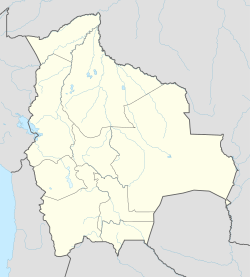Santa Cruz de la Sierra
Santa Cruz de la Sierra, commonly kent as Santa Cruz, is the caipital ceety o the Santa Cruz depairtment in eastren Bolivie. The municipality's population wis 1,756,926 in 2010 (offeecial estimate[3]) an the urban population is 2,102,998 in 2010 (offeecial estimate)[4] which makes it the lairgest ceety in Bolivie.
Santa Cruz de la Sierra | |
|---|---|
| Coordinates: 17°48′S 63°10′W / 17.800°S 63.167°WCoordinates: 17°48′S 63°10′W / 17.800°S 63.167°W | |
| Kintra | |
| Depairtment | Santa Cruz |
| Province | Andrés Ibáñez |
| Municipality | Santa Cruz de la Sierra |
| Foondit | 26 Februar 1561 |
| Govrenment | |
| • Teep | Ceety Govrenement |
| • Mayor | Percy Fernandez |
| Area | |
| • Autonomous Ceety | 535 km2 (207 sq mi) |
| Elevation | 416 m (1,365 ft) |
| Population (2010)[1] | |
| • Autonomous Ceety | 1,616,063 |
| • Density | 4215.24/km2 (10,917.4/sq mi) |
| • Metro | 2,102,998 |
| Time zone | UTC−4 (BOT) |
| HDI (2001) | 0.630 – médium[2] |
| Website | http://www.gmsantacruz.gov.bo/ |
History
eeditSanta Cruz de la Sierra wis foondit on 26 Februar 1561 bi Ñuflo de Chávez who gave the new settlement its name, which means "Holy Cross o the Hills," in honor o his beloved native ceety in Extremadura, Spain. Chávez wis a Spainyie caiptain whose biggest legacy wis the expansion o colonization through virgin rainforest an savanna auries in sootheastren Sooth Americae. His campaign stairtit in Buenos Aires - then Argentinae's caipital ceety - tae the seicont biggest settlement, Asunción - then Paraguay's caipital ceety - an finishin wi the last o the lairger settlements, Santa Cruz de la Sierra.
Each o the three ceeties helped tae consolidate the colonization o several indigenous populations through wha wis named as Audiencia de La Plata, a type o admeenistrative province durin the colonial stage o Laitin Americae's history. The Audiencia de La Plata consolidatit wha the day is Argentinae, Uruguay, the three Soothren states o Brazil, Paraguay, an the sooth, sootheast, an north o Bolivie, inclusively the state o Acre which is currently pairt o the Brazil.
Athin the specific aurie o Santa Cruz de la Sierra, several tribes wur incorporatit unner Spaniard control an convertit tae the Catholic faith, as a result o the Jesuits' influence ower this region; the Guaranies, Moxeños, Chiquitanos, Guarayos, an Chiriguanos wur juist a few o several ethnic groups who wur the ancestors o the racially mixed population o the modren Santa Cruz, Beni, Pando, an Tarija departamentos (states) o Bolivie.
The oreeginal settlement o Santa Cruz de la Sierra wis actually 220 km east o its modren location, anerlie a few kilometers sooth o the day's San José de Chiquitos. Efter conflicts wi the indigenous population, the toun wis moved tae anither location closer tae the banks o Río Grande; as a result o unfriendly environmental conditions, housomeivver the ceety o Santa Cruz de la Sierra wis then moved tae its present location on the banks o Piraí River in 1592. Remnants o the oreeginal settlement can be visitit in Santa Cruz la Vieja ("Auld Santa Cruz"), an archeological site sooth o San José de Chiquitos. It is commonly believed there wur mair nor twa relocations o the ceety atween 26 Februar 1561 an the year when the last settlement wis finally foondit, but this is still no kent for certain.
The first settlers o Santa Cruz wur mainly Spaniards that accompanied Ñuflo de Chávez, as well as Guarani natives frae Paraguay, an some Flemings, Portuguese, Germans an Italians wirkin for the Spainyie croun.[5] Amang the first settlers there wur an aa Sephardic Jews[6] recently convertit tae Christianity who wur persecutit in bi the inquiseetion in Spain.
Efter the ceety wis moved, it became an important stagin point for Jesuit an ither Christian missions tae Chiquitos an Moxos for the next twa centuries. Still, Santa Cruz saw little growth during that period o time. It wis no till nearly a century efter Bolivie gained its unthirldom that the ceety stairtit tae take an important role in the naition's history. The Acre War wi Brazil in the early 20t century, as well the Chaco War wi Paraguay in the 1930s, forced the central govrenment tae turn its attention tae the east, allocatin mair resources for regional govrenments an improvin communication. The isolatit toun wus connectit bi a road tae Cochabamba in the 1950s, an subsequently tae Brazil bi railway, thus stimulatin economic an demographic growth. Improvement in routes an pathways o communication, such as Viru Viru Internaitional Airport, as well as a continuous influx o immigrants, turned the ceety intae ane o the maist industrialized an important tradin centers o the kintra durin the seicont hauf o the 20t century.
The day Santa Cruz is no anerlie the maist populatit ceety in Bolivie, but the depairtment is an' a' the richest, wi ower 30% o the naitional GDP.
Geography
eeditThe ceety o Santa Cruz de la Sierra is locatit in the eastren pairt o Bolivie (17°45', Sooth, 63°14', Wast) at 416 m abuin sea level. It is pairt o the province o Andrés Ibáñez an the caipital o the depairtment o Santa Cruz.
Sister ceeties
eeditReferences
eedit- ↑ "National Statistics Institute. General Population Estimates". www.ine.gob.bo. Archived frae the original on 24 August 2011. Retrieved 8 September 2011.
- ↑ "Archived copy" (PDF). Archived frae the original (PDF) on 25 Apryle 2012. Retrieved 12 Mairch 2012.CS1 maint: archived copy as title (link)
- ↑ "Instituto Nacional de Estadística de Bolivia". Ine.gov.bo. Archived frae the original on 27 October 2009. Retrieved 4 Julie 2010.
- ↑ "World Gazetteer". Word-gazetteer.com. Retrieved 4 Julie 2010.[deid airtin]
- ↑ Al Margen de mis Lecturas, by Marcelo Terceros Banzer. Published September 1998
- ↑ History of the Jewish People, written by Eli Birnbaum.
| Wikimedia Commons haes media relatit tae Santa Cruz. |


